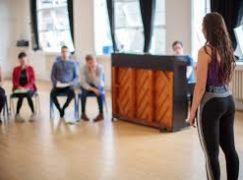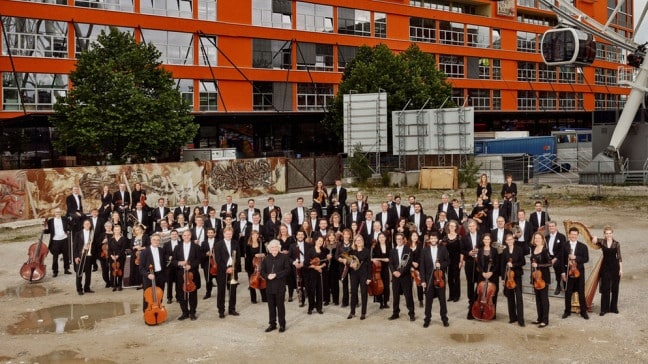World gone mad: Arts school is banned from holding auditions
mainFrom the New York Post:
Parents and even teachers at a Brooklyn performing arts school were shocked to learn Friday that the school can no longer audition prospective students under the district’s new diversity plan.
Families at the New Voices School of Academic and Creative Arts in Sunset Park were blindsided by the news a day after Mayor Bill de Blasio approved a scheme to scrap admissions standards at all middle schools in District 15….
Until now, New Voices — the only performing arts middle school in the Park Slope-to-Sunset Park district — has selected students through auditions and interviews.
But entry will now be based on a lottery — and half the seats will be reserved for low-income, homeless and English-language-learning applicants….
Read on here. And weep.







“But entry will now be based on a lottery”
Perhaps surgeons and airline pilots should be selected on the same basis. It’s only fair, after all.
When was the last time someone died because someone played a chord out of tune?
Much ado about nothing.
Western music dies when there are no more standards.
Right, Western music is relying on a Brooklyn middle school to keep the standards alive.
They don’t do strings or keyboards, either. If we’ve been relying on them to keep the ship afloat, we’ve already lost.
None of them will be going on to important music schools though, will they? That’s OK; less competition for those already there. As I used to say to my school students who said they hated ballet, “great; I don’t have to compete with you for tickets”.
Typical of the airy explaining-it-all-away, though, from the Lefties. When it suits. Leave it to them; they know who should and shouldn’t progress in this world. It’s called ‘social engineering’. The bolsheviks were great at it!!!
Sue emits another of her incoherent diatribes against “the Left” – apparently they are lurking in the shadows everywhere. I forgot where I left my secret decoder ring – could you explain how this differs substantively from someone giving the school a pile of cash and saying that it was to be used for scholarships for kids that weren’t in a position to win auditions? I am confident that 99% of the kids who go to this school, before or after this change, are not in a pipeline to Juilliard or any other such institution. This change might even result in a slightly broader range of people feeling that supporting music in the schools is a good thing.
She’s obsessed. And I find it hard to believe that Sue the teacher (!) didn’t take her obsession into the classroom.
So where would you draw the line? The principle is the same.
A functioning society cannot be built on a series of lotteries.
Life, dear Allen, is a lottery from start to finish, except in the few areas where people with influence manage to skew it in favour of their own interests.
“In 7th grade, about 30 music majors delve more deeply into the foundational elements of music. This is also the big year for learning how to play an instrument-most never having played before.” This is from the website and I think it makes it clear what the school is and what it isn’t.
Under the audition system, the demographics of the school aren’t so far off from the city’s numbers, except for blacks where the representation of students is only one quarter the size of the city’s. That’s a pretty serious gap.
In middle schools student potential is often still a wide open question. Will short term losses by not auditioning be countered in the long run by introducing a wider spectrum of society to the arts and thus expanding the pool of talent? How will they develop this talent without a proven track record of families supporting the student’s artistic aspirations?
Mr. Lebrecht seems not to understand that this is a public middle school, not Juilliard Pre-College, not the 19th century Paris Conservatory, and not even a private school. These are young kids who deserve to have every opportunity open to them no matter their expertise. If young geniuses of the advantaged need special education in one field or another, there are other options. But at this age, the more musically advanced should not be edging out the less experienced at the public expense. This is the whole point of public education.
Dan P.’s comment seems to imply that:
a) all children *not* at Juilliard Pre-College et al. constitute one homogenuous class of *equal* musical (in)ability; and
b) any musical potential that falls short of “genius” does not warrant any attention over and above the generic curriculum for those not manifesting any musical potential.
I find §a hard to believe (although I am unfamiliar with the USA school system), and §b an extremely limiting outlook (although understandable if the alternative would be to neglect the “young geniuses” and let the musical tradition atrophy as a result).
However inconvenient it may be to some factions of the political left, the fact is that streaming children by ability *is* effective. The advancement of any field, specialism, or interest tends to be contingent upon the clustering of a critical mass of people possessing comparable and complementary expertise; in the professional world, such clustering is facilitated by institutions, and enhanced by temporary gatherings such as conferences (consider how important conferences are in both academia and the business world, despite the hideous logistical and financial burden they impose). Historically, problems in the implementation of streaming arise from:
1. bluntness/unreliability of the means of testing children (ultimately, any test is merely a proxy for measuring intelligence/acumen/potential);
2. inflexibility of the testing regime (e.g.: only one make-or-break opportunity, cf. the 11+ in some parts of the UK); and
3. lack of investment in those in the bottom streams.
For children with some potential (but perhaps nowhere close to being “young geniuses”) but no means to access private tuition, an institution that brings them together and tailors its curriculum to that particular level may well be the only means they have of developing it. By suppressing auditions in favour of a lottery, such children are potentially denied the chance of being educated at the slightly higher level that would be locupletative to them, since there would no longer be a critical mass of such children clustered together. Is this supposed to be progress, or is the ulterior motive to lump together all the underprivileged as equally unworthy (cf. Sue’s comment above)?
The road to hell is paved with good intentions. Just feel that heat!!!
Yes, it is madness. I hereby make a motion that all Nobel prizes be awarded via lottery. But, why stop there? Let the Berlin Philharmonic fill vacancies via lottery. The Boston Symphony, too. But, why stop there? Let Mayors of major cities be chosen via lottery. But, why stop there? Let diplomats at the U.N be chosen via lottery. Let surgeons at Johns Hopkins be chosen via lottery. Imagine what Mozart might have accomplished if only…Affirmative Action.
I can’t tell if some of these comments are serious or not – especially those of Mr. Herrera. We are talking about a public middle school that has an emphasis on the arts – not an “arts school.” Why the hysteria about this?
Here in NYC we have many public middle and high schools that are designated “arts” or “Fashion” or “Engineering” or “this and that” schools but it doesn’t mean a thing. This is not a conservatory of any sort and the news is just that they are taking a new step in a process of making admissions to good neighborhood schools more equitable.
Exactly. I get the impression that some here think this is a conservatory of some sort, it’s not.
We know what it is. Thank you for your concern.
Isn’t the whole point that, irregardless of whether this is a fast/slow/nonexistant track to a conservatory, this lottery system will almost certainly guarantee that SOME of the more talented/capable applicants will be pushed out in favor of the randomly accepted ones in both economic categories? Seems like one of those situations where some parent cried foul because their child wasn’t accepted and made a discrimination case. Indeed a world gone mad.
Yes
“It’s a Caucas race…………everybody has won so everybody gets prizes”
(Lewis Carrol)
I started late on my instrument, almost 15. I am one of the better players, but it took time. All the musical contests were set against me. Age discrimination is a real problem. There is too much favoritism for children who start very early. And that continues, as older musicians get pushed aside for the new bright young thing. Classical music needs to deal with its habits of age discrimination.
What instrument do you play? What is one of the most technically challenging pieces that you can perform? I ask because starting at 15 is late for some and prohibitive for others.
Is this quite unfair to those kids who actually spent effort to learn how to perform?
If any of you had any experience of the hell that is the NYC public middle school application frenzy you wouldn’t feel a second’s pain for something that takes even a little of the pressure off. These are 10- and 11-year-old children we’re talking about here.
What was your experience?